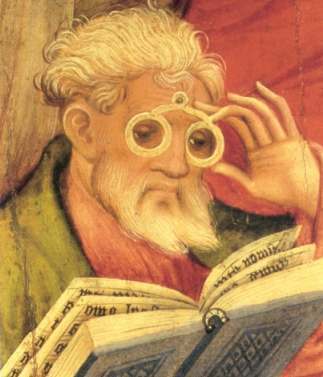I worked lunch at the restaurant, which means I was up early and in the kitchen by eight this morning. When the alarm went off and I stumbled into the bathroom to put in my contacts, I found my left eye was not yet recovered from whatever irritated it last night and the contacts were going to stay in the case rather than caressing my corneas. It was at this point that the fact I packed my prescription eyewear in a place I don’t recall became more significant than it has up until now. I had to go to work – in the kitchen – in all my nearsightedness. I knew I could read the tickets and keep from cutting myself, but everything else would be out of focus.
And that’s how I felt all day long: out of focus.
I had already finished chopping the herbs for the Russian dressing when one of the other cooks said, “Doesn’t the recipe call for parsley?” I had chopped cilantro. I know the difference between the two by smell as much as sight, but I just missed it. I felt awkward in the very room where I am usually most comfortable. I was without confidence doing what I know I do well. I felt out of sync, out of rhythm, out of focus.
I drove home (yes, I drove carefully) wondering what life was like when no one  knew how to correct vision. Eyeglasses, as we know them, didn’t begin to come into being until late in the thirteenth century. For all of human history before then, people had to live with their eyes the way they were. Their vision couldn’t be corrected.
knew how to correct vision. Eyeglasses, as we know them, didn’t begin to come into being until late in the thirteenth century. For all of human history before then, people had to live with their eyes the way they were. Their vision couldn’t be corrected.
I think it’s interesting we use that verb to describe how we help someone see. We don’t heal or adjust; we correct. As a former English teacher, I corrected more papers than I can remember, or wanted to correct for that matter. In the context of the classroom, correct meant pointing out what was wrong: “to point out or mark the errors in,” the dictionary says. The vision version of the verb isn’t about pointing out the errors as it is “to set or make true, accurate, or right.” Simply put, my contacts (and my glasses, when I find them) let me truly see. What the lenses do, in my limited understanding, is refract the light, or bend it so it hits my eye at a different angle, thus allowing me to see what’s in front of me.
I got home from work late this afternoon in time to throw a soup together for our potluck before our Blue Christmas service, which is a refraction of sorts, bending the light of the season to let our sorrows stand in full view. The sanctuary was dressed in candlelight as eleven or twelve of us gathered to help one another see more truly what it means that Christ is being born again in our time. We sang:
what can I give him, poor as I am
if I were a shepherd, I would bring a lamb
if I were a wise man, I would do my part
but what I have to give, I will give my heart
At the front of the church was a Christmas place setting. When we came into the service, we were given small place cards and then invited to write who and what we miss this Christmas. We then came forward and placed our cards at the table as we heard
the depth of God’s love reaches down, down, down
to where we are until we’re found, found, found
a quiet word or none at all pursues the heart behind the wall
and to those who wait with darkness all around
the depth of God’s love reaches down
At the close of the service, Ginger invited us to come forward and stand in a circle around the empty place setting, now surrounded with the small cards. “Take your left hand and place it over your heart,” she said. “Now take your right hand and place it on the back of the person next to you.” As our hands moved, we refracted the love of God one to another, allowing us to see truly we were not alone, even in our grief.
While I was waiting on the soup to finish before I went to church, I decided to try my contacts again. Whatever had irritated my eye was gone and I could see. When the service was over, I had much the same feeling. My part tonight was to sing Andrew Peterson’s “After the Last Tear Falls.” The bridge says:
and in the end, the end is oceans
and oceans of love and love again
we’ll see how the tears that have fallen
were caught in the palms
of the Giver of Love and the Lover of All
and look back on these tears as old tales
because after the last tear falls
there is love, love, love, love
there is love
John says, in one of my favorite verses, “The light shines in the darkness and the darkness cannot put it out.” Tonight, I beg a bit of a paraphrase:
The light bends in the darkness and the darkness cannot keep us from truly seeing.
Peace,
Milton
Ever since I read about Piggy in Lord of the Flies, I’ve had a fear of being left without my glasses. A horror of it. And yet, when it has happened, it is always astonishing how quickly you adjust. sometimes I wonder if my eyes would get better over time if I had no glasses. Because they would have to. Or maybe the straining to focus would change something. Who knows.